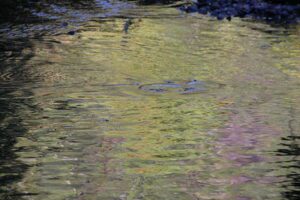Consider then, the poetry of the New Zealand legislation that conferred legal “personhood” upon a river:
The great river flows,
from the mountains to the sea.
I am the river,
and the river is me.
New Zealand has recognized the Whanganui River as “an indivisible and living whole, holding the rights, powers, duties and liabilities of a legal person”- a groundbreaking step forward in legal thinking. Indeed, at its best, law truly is poetry!
What is equally remarkable is that the Whanganui legislation is the second time New Zealand has elevated nature to the status of a person. In 2014 it passed the Te Uruwera Act, granting personhood to the Te Uruwera biosphere- an intact ecosystem regarded by the local maoris as a sacred entity – as an ‘ancestor’; noting in the legislation that Te Uruwera is “abundant in mystery, adventure, and remote beauty.” Hardly the usual turgid prose produced by legislative drafters the world over!
The legislation is an example of the creativity and elasticity of the law in crafting real world solutions to complex societal problems. Legal ‘personhood’ was actually invented several centuries ago, when limited liability companies were first given the legal status of a person, allowing the rise of the modern corporation,and propelling extraordinary economic growth. Now, the legal construct of personhood is being molded in order to protect the environment that was often ravished in the pursuit of that economic growth, and to align the law with the belief systems of indigenous people everywhere.
Indigenous peoples have always had a deep and mythical connection with the environment, and commonly imbue rivers, mountains, plants or animals with spiritual attributes. In that respect they have often been at odds with modern society, as the concept of owning and exploiting natural resources is foreign to most native cultures, where values of stewardship more commonly prevail.
Personhood is important, because it means that the entity involved, such as a river, has rights of its own, rather than rights which are derived from the natural persons using, (or exploiting) the resource. Polluting a river with the status of a person is a crime against the river itself, irrespective of whether natural persons are affected by that pollution. A legal person can take legal action, in it’s own name, to enjoin wrongs done to it, and to protect its very right to exist. It is a concept which goes far beyond the rights accorded in the past few years by the Canadian courts to indigenous peoples to merely be ‘consulted’ before the lands under their stewardship were ravished.
In New Zealand, the recognition of personhood for the ancestor, Te Uruwera, and the river, Te Awa Tupua, represented a huge step forward in the reconciliation process with the Maoris, who had been battling with settlors since the 1800’s to protect their environment. Given the process of reconciliation now underway in Canada, it is perhaps time to consider similar legislative initiatives. Is there, for example, really much difference between the Maoris belief in Te Uruwera as a sprit – an ancestor, and our Tahltan’s reverence for the Sacred Headwaters here in British Columbia, the pristine alpine basin where the Nass, Skeena and Stikine rivers originate? Or for that matter the Fraser River?
The small Innu community of Ekuamishit and the Minganie Regional Municipality in eastern Quebec have taken such a step, declaring the Mutehkau Shipu- the Magpie River, to be a legal person, with 9 specified rights, including the right to exist, and to flow, the right to maintain its integrity, and the right to be free from pollution ,and importantly, the right to take legal action. It is a brave first step, but only a baby one, since municipal governments sit on the bottom rung of the legislative ladder. Nonetheless, a Canadian precedent has now been set, and courts and legislatures love nothing so much as a good precedent, so the first building blocks have been laid.
What will it take to elevate the Magpie River Declaration to the poetry of the New Zealand model? Well, we need to see more senior levels of government begin to confer legal personhood in such circumstances, possibly even granting constitutional recognition to the rights of nature, as Ecuador has recently done- oh, and we need to find some words that rhyme with ‘magpie”.

Fill out the form and one of our highly skilled staff will get back to you within the next business day.
